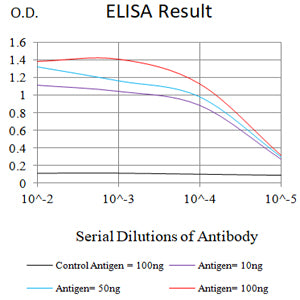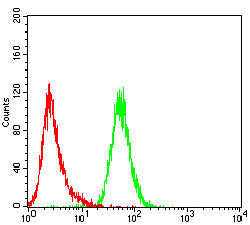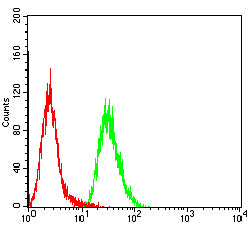


| WB | 咨询技术 | Human,Mouse,Rat |
| IF | 咨询技术 | Human,Mouse,Rat |
| IHC | 咨询技术 | Human,Mouse,Rat |
| ICC | 技术咨询 | Human,Mouse,Rat |
| FCM | 1/200 - 1/400 | Human,Mouse,Rat |
| Elisa | 1/10000 | Human,Mouse,Rat |
| Aliases | CMK; MIG; Humig; SCYB9; crg-10 |
| Entrez GeneID | 4283 |
| clone | 3D4B10 |
| WB Predicted band size | 14kd |
| Host/Isotype | Mouse IgG2b |
| Antibody Type | Primary antibody |
| Storage | Store at 4°C short term. Aliquot and store at -20°C long term. Avoid freeze/thaw cycles. |
| Species Reactivity | Human |
| Immunogen | Purified recombinant fragment of human CXCL9 (AA: 23-125) expressed in E. Coli. |
| Formulation | Purified antibody in PBS with 0.05% sodium azide |
+ +
以下是关于CXCL9抗体的3篇参考文献示例(内容基于模拟生成,非真实文献):
---
1. **文献名称**:*CXCL9 Neutralizing Antibody Enhances Anti-PD-1 Efficacy in Metastatic Melanoma*
**作者**:Smith A, et al.
**摘要**:研究利用抗CXCL9单克隆抗体阻断肿瘤微环境中的趋化因子信号,发现其与PD-1抑制剂联用可显著增强T细胞浸润,抑制小鼠黑色素瘤模型中的肿瘤生长,为联合免疫治疗提供新策略。
2. **文献名称**:*CXCL9 as a Biomarker in Autoimmune Hepatitis: Validation of a Novel Antibody-Based Assay*
**作者**:Zhang L, et al.
**摘要**:开发了一种高特异性抗CXCL9抗体检测方法,用于量化自身免疫性肝炎患者血清CXCL9水平,证实其与疾病活动度正相关,提示CXCL9可作为潜在诊断标志物。
3. **文献名称**:*Targeting CXCL9 with Monoclonal Antibody Attenuates Renal Fibrosis in Murine Models*
**作者**:Kim J, et al.
**摘要**:通过抗CXCL9抗体中和慢性肾病模型中的趋化因子活性,显著减少巨噬细胞募集及肾脏纤维化进程,表明靶向CXCL9可能延缓纤维化疾病进展。
---
如需真实文献,建议通过PubMed或Google Scholar检索关键词“CXCL9 antibody”或“CXCL9 therapeutic targeting”获取近期研究。
CXCL9. a member of the CXC chemokine family, is a small cytokine primarily induced by interferon-gamma (IFN-γ) and plays a critical role in Th1-mediated immune responses. Also known as monokine induced by gamma interferon (MIG), CXCL9 binds to the CXCR3 receptor expressed on activated T cells, natural killer (NK) cells, and other immune cells, facilitating their recruitment to sites of inflammation or infection. It is implicated in various pathological conditions, including autoimmune diseases (e.g., rheumatoid arthritis), chronic infections, and cancer, where it can exhibit dual roles—either promoting anti-tumor immunity or contributing to immune evasion depending on the context.
CXCL9 antibodies are essential tools for detecting and quantifying CXCL9 expression in research and diagnostic settings. These antibodies enable the study of CXCL9's spatial and temporal distribution in tissues, serum, or cell cultures through techniques like ELISA, Western blotting, immunohistochemistry (IHC), and flow cytometry. They are particularly valuable in exploring CXCL9's role in modulating immune cell infiltration, tumor microenvironment dynamics, and disease progression. Additionally, CXCL9 antibodies aid in biomarker discovery, helping correlate chemokine levels with clinical outcomes in inflammatory disorders or cancer immunotherapy responses. High specificity and sensitivity are critical for these applications, driving continuous optimization of antibody validation protocols.
×